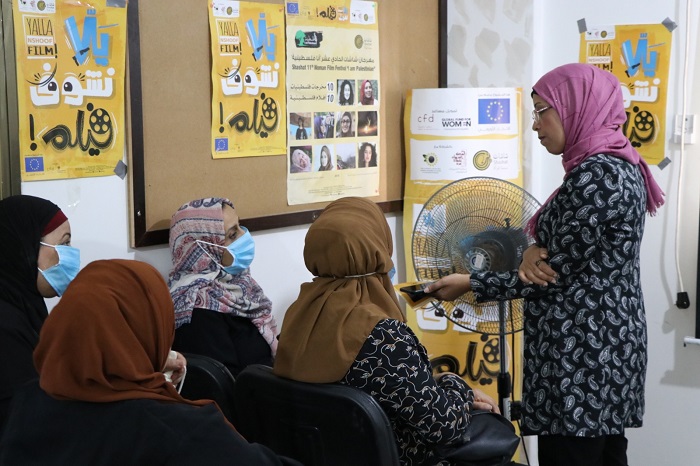
نظمت جمعية الدراسات النسوية التنموية الفلسطينية سلسلة عروض أفلام بالشراكة مع مؤسسة شاشات سينما المرأة ضمن مشروع "يلاّ نشوف فيلم!"، وتأتي هذه الأفلام ضمن مشروع "يلاّ نشوف فيلم!" هو مشروع شراكة ثقافية -مجتمعية تنفذه مؤسسة "شاشات سينما المرأة" بالشراكة مع "جمعية الخريجات الجامعيات" وجمعية "عباد الشمس لحماية الإنسان والبيئة" بدعم رئيسي من الاتحاد الأوروبي ودعم مساند من CFD السويسرية وصندوق المرأة العالمي." تم عرض عدد من الأفلام من انتاج وإخراج فلسطيني، تمثل الأفلام الواقع الفلسطيني في عدة مجالات وعلى أصعدة مختلفة وتؤكد في رسالتها على أهمية التشبث بالهوية الفلسطينية، عرضت الجمعية أفلام (ياريتني مش فلسطينية، ورق دوالي، سرد). فيلم ورق دوالي للمخرجة دينا امين، يستعرض الفيلم قصة جدة المخرجة "فاطمة الماني" سورية الأصل والتي انتقلت للسكن في فلسطين بعد زواجها من الفلسطيني المقدسي "عبدالله الماني"، يبدأ الفيلم بقطف الجدة فاطمة أوراق العنب من "عريشة" منزلها، استعداداً لصناعة هذا الطبق، وينتهي الفيلم بعد أن يجهز الطبق وتضعه شهياً على طاولة الطعام. تسرد الجدة السورية والمقيمة الآن بالقدس تاريخها من دمشق حيث ولدت وعاشت وترعرعت في إحدى البيوت الشامية القديمة والعائلة الكبيرة إلى القدس مع الزوج المقدسي وأول تجربة لها في تحضير الطبق على الطريقة الفلسطينية. تتحدث عن ذكرياتها بين سوريا والقدس حين كانت الطرق متاحة، والازدحام بين المدن العربية في أَوجه حين لم تكن هناك حدود. فيلم ياريتني مش فلسطينية للمخرجة فداء نصر، حيث يصف الفيلم اختلاط المشاعر لدى المخرجة بعد ظروف معينة مرت بحياتها جعلتها أسيرة المنزل، يسلط الفيلم الضوء على المشاعر المختلطة التي تشعر بها الفتيات في مرحلة ما من حياتهن سواء بسبب الوضع الاجتماعي أو الاسري أو الاقتصادي أو حتى السياسي. ويعبر عن أهمية عمل المرأة وانخراطها في الحياة العملية وما له أهمية بتحقيق ذاتها. كما ويوضح الفيلم الواقع الذي تعايشه النساء في فلسطين بسبب الوضع السياسي والاغلاق المستمر وكما ظهر تسلط الاحتلال على الحريات الفلسطينية ومحاولة تكميم افواه الصحافة الفلسطينية لإخفاء حقيقة الجرائم التي يرتكبها الاحتلال بشكل مستمر في حق الشعب الفلسطيني. فيلم سرد للمخرجة زينة رمضان، والذي يعرض قصة الصديقتين ريهام وزينة أحدهما في غزة والأخرى في الضفة الغربية يتواصلن عبر الرسائل الصوتية ويتناقشن بأمور حياتهن البعيدتان مكاناً. يعرض الفيلم قصة ريهام التي تسكن في غزة وتواجه صعوبة بالغة في الخروج منها للالتحاق ببرنامج الماجستير في مجال السينما حيث تم قبول ريهام بمنحة كاملة في رومانيا، وخلال هذه الفترة ترسل ريهام العديد من المقاطع الصوتية إلى زينة عبر وسائل التواصل الاجتماعي، تناقش معها خيارات الخروج إما معبر إسرائيل أو مصر، قدم الفيلم ومعاناة النساء في البحث عن هويتهن في واحدة من أصعب البقع الجغرافية المليئة بالنساء المكافحات الحالمات، اللواتي يسعين بكل الطرق لتحقيق ذاتهن ويعمل بجهد لتحقيق احلامهن على الرغم من كل الظروف المعاكسة لهن. في نهاية العروض عبر الحضور عن أهمية هذه الأفلام في توصيل حقيقة الواقع الفلسطيني للعالم الخارجي، وأن مثل هذه الأفلام تعزز من الهوية الفلسطينية وتعبر عن أهمية التشبث بالأرض والهوية والقضية رغم كل الظروف الاقتصادية والاجتماعية والسياسية.